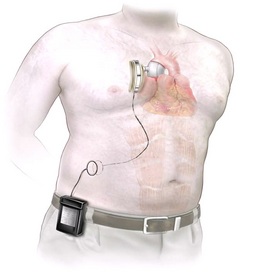MINNEAPOLIS, MN--(Marketwire - June 08, 2011) -
| Highlighted Links |
FDA approved IDE feasibility |
Sunshine Heart |
"There are hundreds of thousands of people with early heart failure that could benefit from a fully-implantable, un-tethered device that is safe and easy to implant and that doesn't compromise patient mobility," said William Cohn, M.D., Director of Minimally Invasive Surgery at Texas Heart Institute. "The promising outcomes of this study could eventually lead to an important therapy that has the potential to change the early management of heart failure, which remains our biggest unmet health care challenge in the United States today."
The C-Pulse system is an investigational device designed to relieve the symptoms of heart failure, such as shortness of breath and reduced mobility, through the use of counter-pulsation technology. A cuff placed around the outside of the ascending aorta (just above the aortic valve) inflates and deflates in synchronization with the heartbeat, potentially improving the efficiency of the heart, increasing coronary blood flow, and reducing the heart's pumping load. Currently, both the C-Pulse power unit (battery) and driver unit are located outside the body and connect to the cuff via tubing that exits through the patient's abdomen.
In the recently-tested, fully-implantable C-Pulse system, the power source remained outside the body. The driver, which controls the C-Pulse cuff, was miniaturized and implanted inside the animal model. The internal driver was powered through the skin using transcutaneous energy transfer (TET), an established technology that uses a high-frequency electromagnetic field to transfer electricity through the skin without wires. The system successfully augmented the animal's heart function, confirming the viability of a fully-implantable unit.
"This important study, which we have now completed more than one year ahead of schedule, demonstrates the feasibility of a C-Pulse system which is powered using TET technology," said Dave Rosa, Sunshine Heart's CEO. "While the company's primary focus is to initiate a pivotal trial using a new single unit system planned for release later in the year, our R&D team will continue to study and refine the specifications of the fully-implantable C-Pulse system. Our goal is to ultimately develop a fully-implantable device that can connect directly to a patient's pacemaker."
The C-Pulse Heart Assist System recently completed enrollment of 20 patients in its U.S. Food and Drug Administration (FDA)-approved investigational device exemption (IDE) feasibility study. The study was primarily designed to assess safety and provide indications of performance of this device in moderate to severe heart failure patients who suffer from symptoms such as shortness of breath and reduced mobility. Once the six-month follow-up with the 20th patient is completed, Sunshine Heart will submit the feasibility data to the FDA. Shortly thereafter, the company will seek FDA approval for the pivotal trial protocol.
The FDA-approved IDE feasibility study is available to men and women between the ages of 18 to 75 who suffer from Class III/ambulatory Class IV heart failure and for whom standard drug therapy has failed. For additional information, please visit www.sunshineheart.com or www.clinicaltrials.gov.
About the C-Pulse Heart Assist System
Using intra-aortic balloon counter-pulsation technology, the C-Pulse Heart Assist System assists the left ventricle by reducing the workload required to pump blood throughout the body. In addition, it increases blood flow to the coronary arteries. Combined, these potential benefits may help reverse the heart failure process or maintain the patient's current condition, thereby preventing the need for later stage heart failure devices, such as left ventricular assist devices (LVADs), artificial hearts or transplants.
About Sunshine Heart
Sunshine Heart (ASX: SHC) is a global medical device company committed to the commercialization of the C-Pulse® Heart Assist System, an implantable, non-blood contacting, heart assist therapy for the treatment of moderate to severe heart failure which can be implanted using a minimally invasive procedure. C-Pulse is designed to relieve the symptoms of heart failure through the use of counter-pulsation technology by enabling an increase in cardiac output, an increase in coronary blood flow, and a reduction in the heart's pumping load. The company has received approval from the U.S. Food and Drug Administration to conduct a U.S. feasibility clinical trial with the C-Pulse System. Sunshine Heart is a Delaware-based corporation headquartered in Minneapolis, MN, with a subsidiary presence in Australia. The company has been listed on the Australian Securities Exchange (ASX) since September 2004. For more information, please visit www.sunshineheart.com.
Media Contact: U.S.
Drew Avril
CoActive Health Communications
(718) 871-7117
davril@coactivepr.com
Media Contact: Australia
Andrew Geddes
CoActive Health Communications
+61 (408) 677 734
ageddes@coactivepr.com


 Digg this
Digg this Bookmark with del.icio.us
Bookmark with del.icio.us Add to Newsvine
Add to Newsvine


